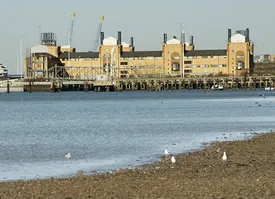
On 12 August in Golden, Colorado, USA, Dr Angus Best of the National Oceanography Centre’s Marine Geoscience Research Group made a successful bid to host the biennial Second International Workshop on Rock Physics at NOC in Southampton in May 2013.
The First International Workshop on Rock Physics, held last week at the Colorado School of Mines, was a resounding success, attracting over 100 delegates from industry and academia with diverse interests in rock physics research and its applications. The petroleum industry was particularly well represented by leading practitioners and generously sponsored the event.
Rock Physics is a multi-discipline subject area that seeks to apply the best scientific knowledge and technologies in geophysics, geology and geochemistry (also petrophysics, geomechanics, geotechnics, acoustics, physics, reservoir engineering, etc.) to the problem of measuring and mapping the physical properties of the Earth.
A notable resurgence of the importance of rock physics to the petroleum industry in recent years is directly related to the improved quality of remote sensing geophysical datasets such as time-lapse seismics (for reservoir monitoring), multi-component seismics (for seismic anisotropy), AVO (seismic amplitude variation with offset), CSEM (controlled source electromagnetics) and borehole logging measurements (sonic, electrical, nuclear). These datasets allow advanced interpretation techniques to extract physical properties of interest, such as reservoir rock type, porosity, permeability, fluid type and saturation.
Dr Best said “The petroleum industry is now investing large sums of money in rock physic research. This will have great benefits to the wider geoscience community in the long run, not least the marine geoscience community seeking to study natural phenomena such as the effect of marine hydrate dissociation on climate change, ocean floor geohazards such as landslides and tsunamis, as well as the safe storage of industrial carbon dioxide in geological reservoirs. All these research areas are heavily reliant on geophysical know-how to ‘see’ beneath the ocean floor and provide the hard numbers needed for climate and hazard prediction modelling.”
“I am delighted to have secured the support of the international rock physics community to host the next Workshop at NOC in Southampton. It will be a great advert for the important research being done at NOC and the University of Southampton, giving vital exposure of our work to industry, and facilitating knowledge exchange. I am looking forward to 2013”.